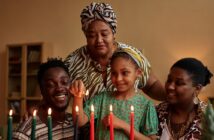Ric Mathis is the filmmaker responsible for B1: The Movie, a perspective on the current economic crisis and its impact on Black Americans, which emphasizes prioritizing the needs of Black people by “getting on code.” Mathis’ book, B1: The Curriculum, gives participants the chance to interact with different prompts and activities relevant to the Black community.
Chike Akua, Ph.D., is a professor of educational leadership at Clark Atlanta University and also contributed to part of Mathis’ B1: The Curriculum with his Akua Media Rating Scale. He spoke to rolling out about what it means to be “on code,” and explained the media rating scale.
When you hear “getting on code,” what does that mean?
It represents the foundation of our culture, that there are certain things that we do as a people, and there are certain things that we don’t do. When it’s certain things that we just don’t do, that means you’re off code. Being on code means loving our people, supporting our people and working collectively, cooperatively and collaboratively. It means lifting us up and not bringing us down. Those are just a few of the things that it means to be on code. Supporting Black businesses, uplifting your race, putting us first — not to the exclusion of other people — but operating in a way that’s in our own best interest. We’ve been trained to do the exact opposite. Right now, so many of our young people have only been exposed to the worst of our culture, and then they begin to associate Blackness with violence, ignorance and criminality, rather than associating Blackness with excellence, achievement and respect. One of the things I appreciate about this film is it helps us to recenter ourselves in the best of our culture.
What is the Akua Media Rating Scale?
As an educator, I learned very early on telling students what to believe is not part of what education is about. Not only that, it’s not effective, either. You have to present information in such a way that people can draw their conclusions. I could see the effect and the impact that media was having on my students’ behavior and their thinking, but they weren’t seeing it in themselves. Way back in the ’90s, I developed the Akua Media Rating Scale as a way for them to critically analyze the media that they were consuming so they could choose their program, their video or their movie. The scale has 10 questions on it, and you’re supposed to rate that video, TV program or movie on a scale of one to 10, with 10 being the highest. For example, some of the questions are: “What is the image of Black manhood in this movie or program? What is the image of Black womanhood? What is the image of Black family life? Is there unnecessary profanity? Does the main character undergo a transformation and an awakening of consciousness that changes their behavior and their circumstances?”
Here is the registration link for the B1 Kwanzaa event.



